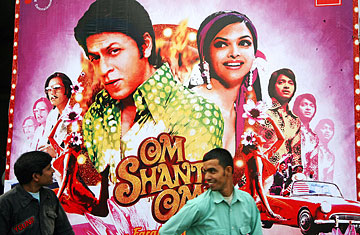
Men pass by a poster for a Bollywood film outside a cinema in New Delhi
There's been no lights, camera or action in Bollywood since Wednesday, when roughly 150,000 film workers began a strike to demand better wages, less punishing working hours and a ban on non-unionized labor. With no dancing girls to mysteriously appear out of nowhere when a star begins to sing, and no spot-boys to keep the sets functioning, film and TV shoots have ground to a halt because of the action brought by the Federation of Western India Cine Employees. "All shoots are off. The producers have not stuck to the terms of the agreement they signed with us 1 1/2 years back," says Dinesh Chaturvedi, general secretary of the federation. The timing will hurt films slated for release around the Hindu festival of Diwali; along with this week's Muslim festival of Eid al-Fitr, this period usually triggers some of Bollywood's biggest box-office releases of the year. The strike isn't expected to affect the distribution of films during the holiday, but publicity will be most affected. The worst-hit area looks to be television, with the fate of dozens of serials, reality shows and daily programs looking grim. "We are not happy to call for this noncooperation," Chaturvedi says, "but we are helpless."
At the heart of the dispute lies an agreement reached between the workers and producers last January to raise wages 12.5%. Workers say some producers have not been paying them the stipulated rate (and some complain that they haven't been paid at all for months) and that they have resorted to a strike only after repeated warnings failed to yield results. The strikers argue there is no justifiable reason why producers should not be paying up, given the prosperity the industry is enjoying as a result of booming demand. Bollywood recorded revenues close to $1.9 billion in 2007, which are likely to rise to $3.9 billion by 2012, while advertising revenue for cable TV was $1.02 billion in 2005 and is forecast to grow to $1.8 billion by 2010. Film-trade analyst Komal Nahta says, "If you can pay [$10 million] to top stars like Akshay Kumar (Singh Is Kinng), surely there should be no problem paying junior artists."
Producers dismiss the union claims as specious. "It's hard to believe [the strikers' charge that] there are producers who haven't paid workers for months. There's so much work around these days, workers would simply leave and go elsewhere," says Kavita Barjatya, head of TV production at Rajshri Films, one of Bollywood's oldest and best-known production houses. Many producers say they will resist what they see as bullying by unionized workers and have vowed to hold out indefinitely. But the union is betting that producers will be forced to relent by the massive daily losses and administrative chaos caused by the strike — TV shows may be forced into reruns, and when the strike is eventually resolved, actors' dates and travel schedules will have to rejigged, locations rebooked and thousands of workers and junior artists rehired. Barjatya also wants the workers to clean up their act: "They're forever showing up late because they've signed on to too many shows. Shouldn't they also be held up to some standard of professional behavior?"
While members want better working conditions too, claiming they often have to work back-to-back shifts, they're also angry at producers for hiring many non-unionized workers, especially when it comes to the junior artists. Producers seem to think the unionized junior artists no longer gel with the contemporary settings of their films. These artists were more in demand when films with socialistic messages set in rural India were the norm, but now movies and TV shows are increasingly about an upwardly mobile, young and urban India. As a result, producers have been hiring college students, aspiring models or even foreigners if the production is supposedly situated abroad. Trade analyst Nahta says there is also a concerted but underhand attempt by producers to break the existing workers' union. "They say the federation bullies them and dictates terms. So they're trying to break this monopoly and create an alternative union," he says. But Anil Nagrath, secretary of the Indian Motion Pictures Producers Association, argues that the demand that producers employ only union members stifles the industry's creativity. "They [the workers' union] want to restrict all creative freedom. How will I make a film if I can't decide which junior artist to employ? They're forcing producers to leave Mumbai and shoot elsewhere."
In some ways, these problems are typical of an industry gradually modernizing and finding itself caught between the Bollywood of yesterday, which was run like a family business and worked on connections and affiliations, and the Bollywood of tomorrow, where production houses will be run like corporations. "As of now, age-old values like loyalty to employers and affiliation to employees are still meaningful," says Barjatya. "For example, an established production house like Rajshri pays old employees' medical bills even though we're not legally obligated to. And workers remain loyal to us in view of that." But as newer production houses come in and existing ones get more professionally managed, it's clear that a system of legally enforceable rules that will apply equally to everyone is needed.
But the immediate problem is how to resolve the current stalemate. Talks between workers and producers on Wednesday failed to reach an agreement, but Nahta predicts a resolution by Sunday. "Both sides will have to give in a little, and by Sunday they will have had time to iron out the problems." Trust Bollywood to script a happy ending.
